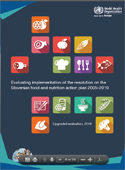Evaluating implementation of the resolution on the Slovenian food and nutrition action plan 2005–2010. Upgraded evaluation, 2016

Download
Slovenia, like the vast majority of countries in Europe, has been confronted with the spread of unhealthy diets and physical inactivity in its population. Obesity in particular became the most relevant health problem in school-age children. The country has, however, been dealing with the problem in an exemplary way, using innovative approaches to the promotion of healthier diets, improving physical activity levels and preventing childhood obesity.
High-level political commitment and a relentless effort for a sustainable governance mechanism with stakeholders who have a vision to reduce inequality in diet and physical activity appear to have been the ingredients for the solid progress achieved so far in Slovenia.
Slovenia has been in the forefront of many actions to promote public health in the WHO European Region. It is one of the most determined, innovative countries, always looking for new solutions to promote and protect the health and well-being of its citizens. It was notably one of the first Member States to embrace the WHO European Region public policy, Health 2020.Slovenia has shown strong leadership in public health, not only with its ground-breaking policies but also in implementing and evaluating them. Slovenia’s nutrition policies and actions are no exception.
This report was prepared to evaluate Slovenian policies on nutrition and may be used by other Member States in the Region and particularly their policy-makers in health and welfare authorities at local and national levels, health care providers and professionals, civil society organizations and researchers.



